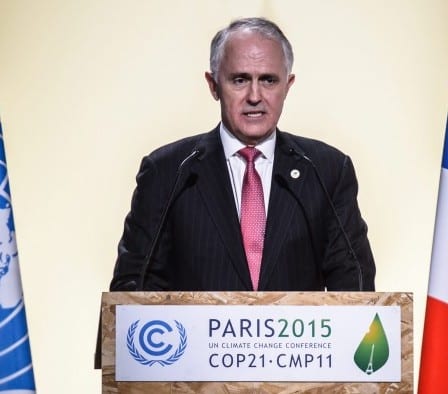Budgets are centrepiece moments for governments. They lay out spending and savings but they also highlight values and choices, along with the agenda the government will pursue in the coming financial year. Decisions often have legislative implications that must be wrangled through the Senate and therefore dominate the political agenda for months if not the following year.
Unfortunately, the second budget of the Turnbull Government continues their dire management of Australia’s energy and climate change policy. By the government’s own admission, they are in the grip of an ‘energy crisis’ largely concerning east coast gas supplies. The energy sector overall has been plagued by policy uncertainty.
Earlier in the week the Energy and Environment Minister admitted Australia wouldn’t meet its Paris Commitment of net zero emissions by 2050 and instead the end of the century was a more realistic ambition.
This ambition ignores the overwhelming scientific evidence that net zero emissions by the end of the century is totally inadequate in avoiding extremely dangerous climate change. It is inconsistent with the Paris Agreement goal of holding global warming well below 2 degrees and to pursue a 1.5-degree limit. In short, it is a grossly negligent position from Australia’s environment minister.
Despite these self-identified challenges the Federal Budget fails to address them. The current centrepiece of the Government’s climate policy the Emission Reduction Fund (ERF) remains under a cloud with no further funding allocated in the Budget.
It has only $300m remaining in the fund. This lack of further funding may demonstrate the Government’s willingness to review its effectiveness through their climate policy review.
Alternatively, it may just be a common trick to help make the budget bottom line look better in future years.
Either way the ERF is the main mechanism in place to mitigate Australia’s climate pollution and its future is uncertain. Its effectiveness is also highly questionable considering its $2.55 billion price tag and the fact that it has achieved only a fraction of the pollution reduction needed to achieve Australia’s 2030 Paris target.
Funding for the Australian Renewable Energy Agency (ARENA) remains as agreed to by the Government and the Opposition following the deal they struck after the election. The two final years of ARENA funding are $137m funding in year 2020-21 leaving $110m in 2021-22. The future of ARENA is uncertain past 2021-22.
Yet, it seems clear that there is a legitimate case for longer term retention of ARENA’s important research, development, and demonstration work that supports Australia’s renewable energy innovation. The case for further funding will need to be made over the next year or two to ensure long term funding.
Other announcements included the Government reaffirming their $110m loan commitment for the solar thermal project in Port Augusta. The Government also announced a $90m package for gas.
Most of the package will go to measures that will accelerate exploration and assessment of onshore gas and lay the groundwork for new gas pipelines. Minister Frydenberg stated in the accompanying media release that “gas is a crucial energy source as we transition to a low carbon economy.”
It is clear from this budget that the Coalition government is failing to undertake the longer term strategic thinking that is needed to transform Australia’s energy system and wider economy to address Australia’s growing emissions.
The Coalition point to economic management as one of their key selling points. But this is their fourth budget since coming to Government and there is little evidence that they have joined the dots on the need to manage the energy transition to avoid economic disruption, ensure the health of Australia’s environment, ensure Australia’s prosperity, limit the impact on communities such as Victoria’s La Trobe Valley and ensure a clean, reliable energy future for all Australians.
It seems an age ago that Malcolm Turnbull seized the leadership of the Liberal Party from Tony Abbott and became Prime Minister. The country seemed genuinely relieved that a relatively more modern outlook would now emanate from the Prime Minister’s office.
In the area of energy and climate policy Malcolm Turnbull had demonstrated over many years that he believed climate change was a major challenge for Australia and he had staked his previous leadership of the Liberal party on it.
Unfortunately, the evidence is accumulating with the Federal Budget the latest example that Malcolm Turnbull and Josh Frydenberg are following their predecessors in failing to grapple with climate change and its environmental consequences.
A standard line from the government concerns avoiding passing the burden of financial debt onto future generations.
What this line fails to address is the environmental and financial debt that the legacy of dangerous climate change will leave on the budget balance sheet. Including the cost of more frequent natural disasters.
This budget has demonstrated that even under the leadership of Malcolm Turnbull this government remains unwilling to put the country first by setting in place policies with appropriate funding to transition the energy sector and reduce Australia’s emissions.
Matt Rose is an economist with the Australian Conservation Foundation











